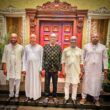Lokoja, Nigeria
Kogi State, often referred to as the “Confluence State” due to the meeting point of the Rivers Niger and Benue, is not only a geographic convergence but also a melting pot of Nigeria’s rich ethnic and linguistic diversity. The state is home to several indigenous ethnic groups, each with its own unique language and cultural heritage. Among these, Ebira stands out as the most widely spoken language in the state today.

Ebira, primarily spoken in the central region, covering areas such as Okene, Adavi, Okehi, Ajaokuta, and parts of Lokoja has gained significant prominence due to the population density and central location of the Ebira-speaking communities. The language plays a vital role in commerce, inter-communal communication, and local governance, making it the most dominant in the state’s linguistic landscape.
Next in spread is Igala, spoken in the eastern part of the state including Idah, Dekina, Ankpa, Ibaji, and Olamaboro. The Igala people, one of the largest ethnic groups in Kogi, have a deep historical and political influence, and their language is a key component of their identity and governance structure.

In the western region of the state, the Okun people, a Yoruba-speaking group, communicate in various dialects such as Owé, Ìyàgbà, Ìjùmú, Bùnú, and Oworo. Collectively known as the Okun dialects, these languages are part of the Northeast Yoruba linguistic group and reflect the strong Yoruba cultural presence in the area, particularly in local government areas like Kabba-Bunu, Yagba East, Yagba West, Ijumu, and Mopa-Muro.
Beyond these dominant groups, Kogi also accommodates smaller yet culturally rich communities such as the Bassa, whose language is spoken in Bassa Local Government Area and parts of Lokoja, and the Nupe, predominantly found in riverine and border areas near Niger and Kwara States.

Although not indigenous to Kogi State, Hausa plays a functional role across the region, serving as a lingua franca in trade, urban centers, and interethnic communication.
Kogi State’s multilingual composition not only showcases the richness of Nigeria’s cultural heritage but also highlights the need for inclusive governance, intercultural understanding, and the preservation of indigenous languages. From Ebira to Igala, and from Okun dialects to Bassa and Nupe, each language contributes to the state’s vibrant and diverse identity.







